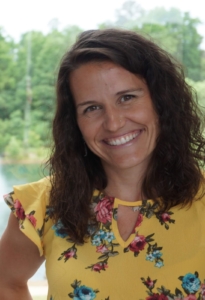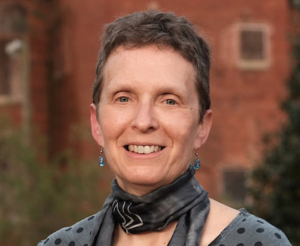Where There’s Poetry, Prose Will Surely Follow
 A few weeks ago, I had the honor of hearing Ada Limón read her work at Queens University as part of the Charlotte Lit’s 4X4 Series. Small in stature but huge in heart, her warmth and wit filled the auditorium while her words brought tears to our eyes. One piece in particular struck a chord with me.
A few weeks ago, I had the honor of hearing Ada Limón read her work at Queens University as part of the Charlotte Lit’s 4X4 Series. Small in stature but huge in heart, her warmth and wit filled the auditorium while her words brought tears to our eyes. One piece in particular struck a chord with me.
“The Raincoat” (excerpt)
…My god,
I thought, my whole life I’ve been under her
raincoat thinking it was somehow a marvel
that I never got wet.
And there it was, the reaction I have experienced so many times before when faced with heart-shattering imagery that hits a little too close to home. I had to write. Immediately.
I went home that night and sat at my computer. It wasn’t that I believed I could write poetry of my own or even some polished piece that would someday rival Limon’s brilliance. It was because I am a writer and words are how I process the world. The mother I lost to Alzheimer’s was my raincoat and now I must do the same for my two teenage children. Hearing Limón point it out so boldly left me spiraling with emotions and ideas. There was nowhere to hide.
Poetry makes us better humans by stirring up our emotional pots. It does not mean that we all must write it, but I have countless drafts that started because someone crafted a piece of poetry that shook me to my very core. It was an image or idea staring at me in the sea of blank space on the page. In all that silence, it could not be ignored. My words poured onto the page.
Pandora’s box had been opened to a sea of memories, regrets, resentments, and everything in between for me that September evening. Facing these demons is hard and necessary work, and while prose is my form of choice, I am thankful every day for the poets who awaken my soul to what lies bubbling just below the surface.
ABOUT JAMIE: Jaime Pollard-Smith is a full-time writing instructor at Central Piedmont Community College with a Master of Arts from New York University. Her fiction has been published in Literary Mama. She is a contributor for Scary Mommy and Project We Forgot. Read her thoughts at unbecoming.co.
PUT POETRY INTO YOUR PROSE: Join Jamie for Putting Poetry Into Your Prose on December 2nd, in person at Charlotte Lit. What can the prose writer learn from the poet? Let us count the ways: sound, rhythm, word play, word choice, concision, and so much more. In this session, we’ll read and discuss several prose passages that employ one or more tricks from the poet’s toolbox. Then, we’ll explore the ways we can use those techniques to strengthen our own prose, trying our hands at a few of them through in-class writing prompts.
PLEASE NOTE: Proof of full Covid vaccination is required to attend in-person Charlotte Lit events. Send a pic of your vaccination card to staff@charlottelit.org.
Historical Fiction
The Past Comes Alive on the Page
The task facing the historical fiction writer is to bring research to life. In a journal article or history book, you might read that 19th-century American theaters were rowdy places in which audiences frequently booed actors off the stage. In contrast, a historical novel would take you into the boxes and “parquet,” or orchestra seating, and show the repercussions of a poor performance. This excerpt from my forthcoming novel, Dear Miss Cushman, set in the New York City theater world in 1852, demonstrates this idea.
When the audience began hissing, I knew Othello wasn’t going to end well. The response jolted me. We weren’t at the Bowery Theatre, where the audience in the pit tossed apples and vegetables onto the stage if a performance didn’t please them. The Prince Theatre was one of New York City’s finest establishments, catering to the upper ten.
Worse, the actor they hissed at was my father.
I was attending my first theatrical performance. Incredible, given that my father was a renowned leading actor, but Mama maintained that theater wasn’t a place for young ladies. For my eighteenth birthday, she gave in to my pleading and permitted Uncle James to accompany me to my father’s performance of the Moor, one of his most acclaimed roles. Mama insisted I have a new dress, and my sister Maude oohed and aahed over the sky blue taffeta until I wanted to take it off and give it to her. I myself put little stock in puffy lady things, especially in pastel hues. Plus, the heavy horsehair crinoline the skirt required for shape made beads of sweat trickle down my stomach.
Still, I could abide these discomforts if it meant I got to sit beside my dapper uncle in his lushly adorned box, draped with red and gold silk, and marvel at the glistening gas-jet chandelier that lit the space. Best of all, I got to watch my father tread the boards as I’d imagined him doing, in full costume and makeup for the Moor and sporting his prize sword.
We were barely one act in when Pa dropped a few lines. Then more—even the ones I ran with him that morning “for good measure,” as he’d urged. He’d appeared in Othello dozens of times, but now the role appeared to baffle him. Although the movement made my stays pinch, I leaned forward, mouthing the words, willing them into his memory.
Taunts rose slowly through the cavernous parquet. Pa squinted toward the footlights in bewilderment….
The audience response crescendoed into boos. Uncle James colored crimson. “We’re leaving,” he announced, spittle collecting at the corners of his lips. He tugged me to my feet. “Now, Georgiana.”
Paula Martinac is the author of the forthcoming historical novel Dear Miss Cushman (Bywater Books, December 2021), and six others, including Testimony; Clio Rising, Gold Medalist, Northeast Region, 2020 Independent Publisher Book Awards; and The Ada Decades, a finalist for the 2018 Ferro-Grumley Award in LGBTQ Fiction. Out of Time, her debut novel, won a Lambda Literary Award. She has received fellowships from North Carolina Arts Council and the Arts and Science Council and teaches in the creative writing program at UNC Charlotte.
EXPLORE HISTORICAL FICTION WITH PAULA: Join Paula for Writing Historical Fiction online. Historical fiction has the power to bring people and places from the past to life. If you’re drawn to this genre (or one of its sub-genres, like historical mystery or romance), this class will provide you with motivation and skills to start writing. By the end of the class, you will have a scene or chapter for a work-in-progress or an outline and character biographies that give you a solid path forward. This class meets on three Tuesdays, November 30, December 7 and 14, 6:00-8:00 p.m. More information here.

